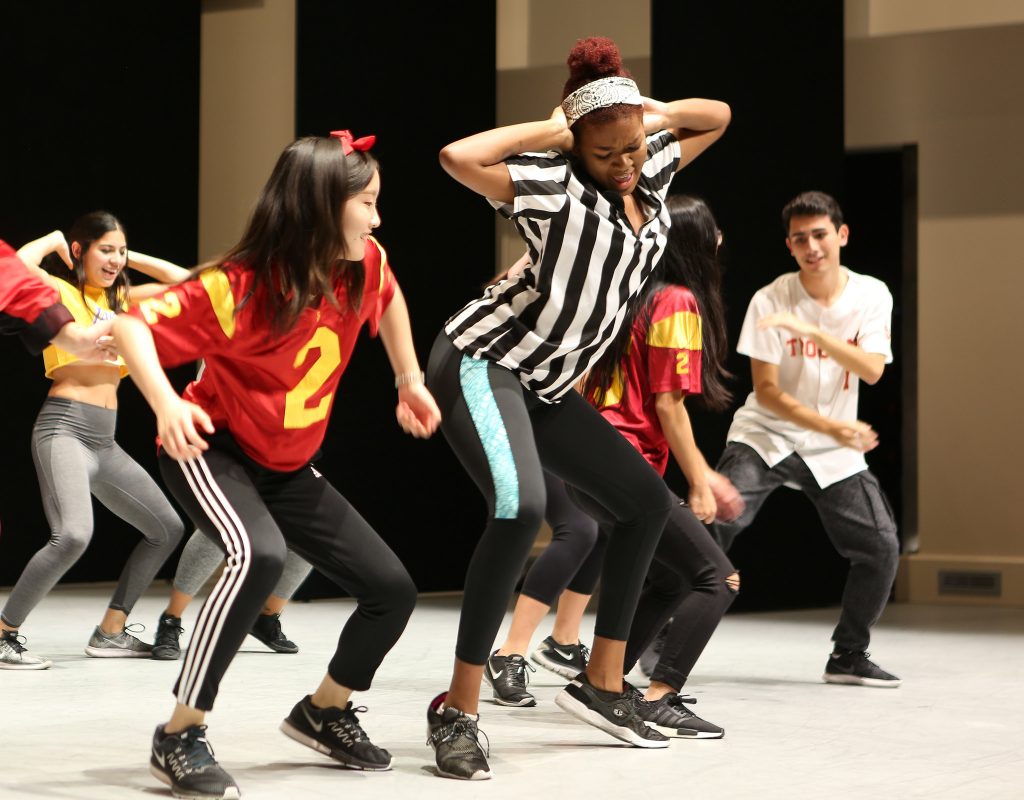Minor Programs
December 2, 2018

Students from Tiffany Bong's hip-hop class perform at the Elective Experience showcase | Photo by Mary Mallaney
This “Curriculum in Focus” post focuses on minor programs—outside minor programs for students pursuing the BFA in Dance and dance minor programs for students in other majors.
Minors of our BFA students
I’ve written a lot about how being a conservatory embedded within a major research university affords our students with incredible opportunities. One of them is the option to minor outside of dance.
In the early development of the curriculum, we knew that having the freedom to explore other academic interests was going to be a priority for many of our students. It took a lot of shifting around, but we found the space for our students to explore those passions.
More specifically, our 132-unit program has 16 free elective units. (In reality, your tuition pays for 28 free elective units—so there’s a lot you can do.) You can pursue most of USC’s 150 minors and still graduate in four years. Alternately, you can start on a second major or pre-professional emphasis—though you will be at USC for more than four years. Finally, you can start a progressive degree program, whereby you start your graduate coursework as an undergraduate. Here are some of the options our students are currently pursuing:
Minors
- Architecture
- Business
- Business Finance
- Cinematic Arts
- Communication Design
- Computer Programming
- Cultural Anthropology
- Culture, Media and Entertainment
- Economics
- Education and Society
- Entrepreneurship
- Gender Studies
- Global Health
- History
- Marketing
- Music Industry
- Narrative Structure
- Natural Science
- Nonprofits, Philanthropy and Volunteerism (one of our most popular)
- Nutrition and Health Promotion
- Occupational Science
- Performance Science
- Political Science
- Public Relations
- Real Estate Development
Pre-professional emphases
- Pre-Law
- Pre-Medicine
Second majors
- Health and Human Sciences
- Non-Governmental Organizations and Social Change
Progressive Degree (Master’s level)
- Public Administration
- Economics (TBD)
- Communications Management (TBD)
Of course, you don’t have to pursue a second formal program of study. I’d say that only about half of students do. Instead, you can use those extra units to take more dance classes, to take classes that will build additional skills, and/or take classes just for fun. There are some really cool classes out there, after all!
Essentially, the point is that our program supports your other interests. In fact, we hope that you will find a way to bring dance and those interests together to create something totally new.
Dance minors for students pursuing other majors
I often get asked if you can minor in dance, if you are not admitted to the major. My answer: Absolutely! We have a booming minor population across three programs:
Dance Minor
The Dance Minor provides a broad but deep foundation in dance. At its core, it includes a critical study of the history and culture of dance, while also weaving in courses in choreography, performance and dance technique.
Hip-Hop, Street and Social Dance Forms Minor
The Hip Hop, Street and Social Dance Forms Minor delves into the historical, social and aesthetic issues of dance in the contemporary settings. It ultimately explores the foundations and structures of hip hop, street and social dances addresses issues of art, race and politics within the parameters of dance as an art form, entertainment and personal expression.
Dance in Entertainment Minor
The Dance in Entertainment Minor explores dance in the commercial realm—from Hollywood to Broadway—primarily focused on performance, choreography and dance entrepreneurship.
Minor students are able to take technique classes in various levels from the same core faculty as our majors. Like our majors, they serve as ambassadors for dance and are considered a part of the USC Kaufman Family.
By Anne Aubert-Santelli, Assistant Dean for Admission and Student Services